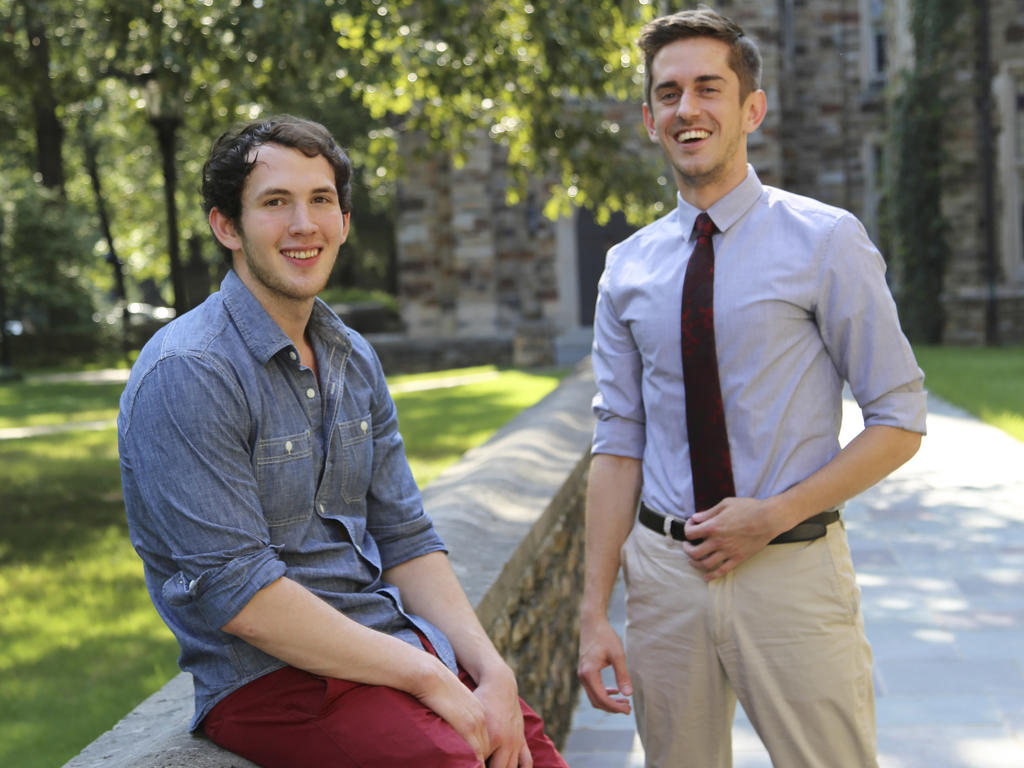Summertime at Rhodes presents an opportunity for students to get out of the classroom and conduct real-world research on topics that particularly interest them. Arkansas native Zachary Kauffman ’17 teamed up this summer with psychology professor Dr. Geoffrey Maddox to study “The Role of Encoding Variability in Explaining Spacing Effect.”
Conducted in the Memory and Cognition Lab, Kauffman’s study hypothesized that memory for material is maximized when it is studied in different contexts compared to material repeatedly studied in the same context. Put simply, Kauffman’s summer research focused on word memorization. He hoped to show that increasing the variety of contexts in which a word is memorized (e.g., introducing variables such as instructor gender, background color of the presenting screen, or varying the semantic processing of the word) would allow the participants in his study to realize their greatest recall potential. He explains that increasing the variability of the context under which one studies forces the individual to put forth more mental effort in memorizing the information, resulting in more effective cognitive encoding. Kauffman notes that since exams require students to recall information, it makes sense that they should increase the difficulty of their memorization tactics to maximize their recall capacity.
Kauffman research was funded by the Margaret Ruffin Hyde Award. “This funded my research needs, as well as my room and board and a monthly stipend for living expenses,” says Kauffman. “I applied for the award because I intend to pursue honors research the fall of my senior year and I wanted to spend the summer developing my research skills.” The opportunities afforded by Rhodes to conduct this and other research has been a recurring resource for Kauffman, who presents yearly at Rhodes’ URCAS program and who also presented at the Annual Association for Psychological Science Convention in New York in 2015.
Kauffman says working with Maddox has been rewarding. “He and I have formed a strong academic bond as a result of my conducting research with him for the last two years. He’s aided in teaching me how to develop research materials and how to program my research studies to be taken on the computer. However, Dr. Maddox leaves it to me to design my own research projects and pursue research in line with my personal interests.”
Maddox notes that he has been impressed with Kauffman’s development in the lab: “Over the course of the last two years, he has transformed from a young researcher who required guidance while initially honing his research skills to a senior lab member who operates independently in almost all stages of the research process.”
After graduation, Kauffman intends to attend medical school after a gap year. And while he is still unclear as to what field of medicine he hopes to enter, his psychology research has left him with some valuable skills. “I’ve learned solid research practices and ethics principles that will be useful if I decide to do research in medical school or beyond. Presenting my research at conferences and for faculty has helped my hone my public speaking skills, and studying literature relevant to my research has developed my ability to critically evaluate scientific writing.”
Kauffman is confident that his research this summer will support his hypothesis, and that his study could have implications on a macro-level. “Broadly, my research can benefit people of all ages and in all walks of life, as it focuses on developing tools for improving one’s memory and cognitive processes,” says Kauffman. And after all, he asks, “Who wouldn’t benefit from a better memory?”
By Drew McCormick '18
